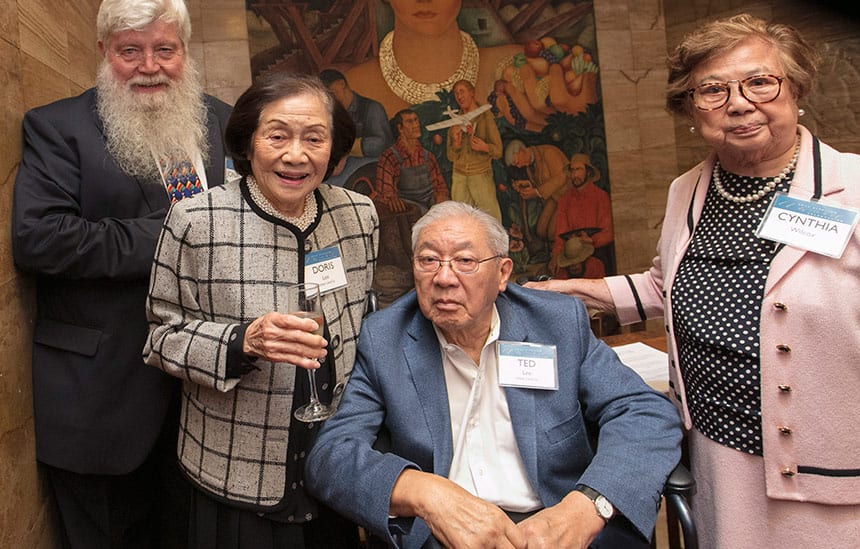
By Andrew Cohen
On a sun-filled day across the Bay Area, members of the law school community gathered in San Francisco June 15 to celebrate its 2017 Citation Award honorees: Ted Lee ’59 (Citation Award), Stephen Sugarman (Faculty Lifetime Achievement Award), and Ann O’Leary (Young Alumni Award).
Berkeley Law’s highest honor, the Citation Award recognizes exceptional contributions to the bar, the bench, legal scholarship, the state, nation, and the world. Lee’s remarkably unique career in real estate and redevelopment included a series of triumphs—but not without challenges.
When Lee first conveyed his desire to attend Harvard, his high school guidance counselor laughed at him. More than 65 years later, Greg Lee described how that experience shaped his father’s extraordinary life.
“That started his road to becoming a fighter who would compete against anyone who disrespected him or underestimated him,” Greg said while accepting the Citation Award on his father’s behalf at a spirited luncheon ceremony inside the City Club of San Francisco. “He took this fight into courtrooms, into business, and into the society in which he lived.”
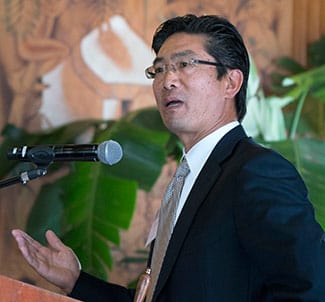
At an event two years ago, someone asked Lee why he became an entrepreneur instead of working for a big company. “My dad said he had no choice because no one would hire him,” Greg recalled. “Like many minorities of his era, he couldn’t get anyone to interview him, let alone hire him.”
Undaunted, Lee leaned on his positive experience at Berkeley Law, which Greg said he viewed as “a special place in its openness and egalitarian nature. The school gave him a love of the law … and a feeling that he could find common ground and a common language to make a positive difference.”
The son of a first-generation Chinese immigrant grocer, Lee spent two years in Singapore on an international legal studies fellowship before moving to Hawaii to direct the University of Hawaii’s East-West Center. In both places, he also helped reverse longstanding exclusionary policies in social clubs and business fraternities.
Lee later earned his MBA in urban planning and real estate at UC Berkeley’s Haas School of business. He founded Urban Land Company and helped guide major projects across California and Nevada. He also began organizing area minority communities “such as the Chinese in Sacramento, the Filipinos in Stockton, and the Japanese in San Francisco, to redevelop their own communities so that they wouldn’t lose them,” Greg said.
Lee and his wife, Doris Lee, built the Eureka Casino Hotel in Mesquite, Nevada, in 1995. They have also been fierce advocates and generous philanthropists for education, supporting several UC units with scholarships, endowed chairs, annual giving, and buildings. Lee also served the university in myriad ways, including as president of the Boalt Hall Alumni Association (BHAA), while clearly maintaining a sense of humility and humor.
“When I asked my father for some guidance on what I might share with you,” Greg Lee said, “he didn’t give me much help except to say, ‘Greg don’t embellish my academic record. I have a lot of friends here who know.’”
Faculty Lifetime Achievement Award
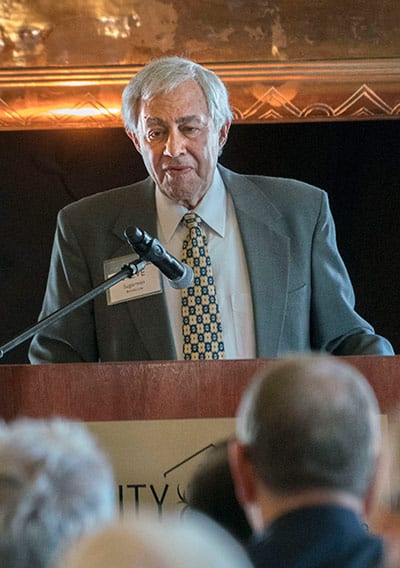
Professor Stephen Sugarman won the Faculty Lifetime Achievement Award, which honors the contributions and accomplishments of an exemplary Berkeley Law educator. A faculty member at the school since 1972, Sugarman also served as an associate dean from 1980-1982 and from 2004-2009. He played an integral role in developing the school’s clinical program and research centers, bolstering financial aid, expanding the physical plant, and recruiting faculty.
Interim Dean and event host Melissa Murray noted Sugarman’s impact in a diverse range of issues—such as school funding, education policy, income transfer programs, sports law, and food law—and how it led to “path-breaking scholarship and exciting new courses.”
Speaking while millions converged on Lake Merritt to celebrate the newly-crowned NBA champion Golden State Warriors, Sugarman said, “I really appreciate that so many of you are here today instead of at the parade going on in Oakland.” He also expressed great appreciation for his 45 years at Berkeley Law.
“When we get together in the faculty lounge to talk about our jobs, we say, ‘You know, we have the best jobs in the world’—and we really mean it,” Sugarman said. “There’s a constant flow and endless supply of amazingly smart new students. And with so many outlets for legal scholarship, we get to write about just about anything we like to focus on.”
A regular teacher of Torts, Sugarman has also taught Sports Law, Food Law and Policy, Educational Policy and Law, and other courses in the social justice curriculum. While his teaching and scholarly reach is expansive, he cited “one theme that runs through a great deal of my writing—I believe the government can play a strong role in empowering people to achieve their life plan.”
Young Alumni Award
A powerful advocate for families and children, Ann O’Leary received the Young Alumni Award, which honors a graduate from the past 15 years who has made significant contributions through professional, charitable, or other public service activities. A special advisor to President Bill Clinton and legislative director for Senator Hillary Clinton before law school, she won Berkeley Law’s prestigious Brian M. Sax Prize for Excellence in Clinical Advocacy in 2005 for her stellar work at the East Bay Community Law Center (EBCLC).
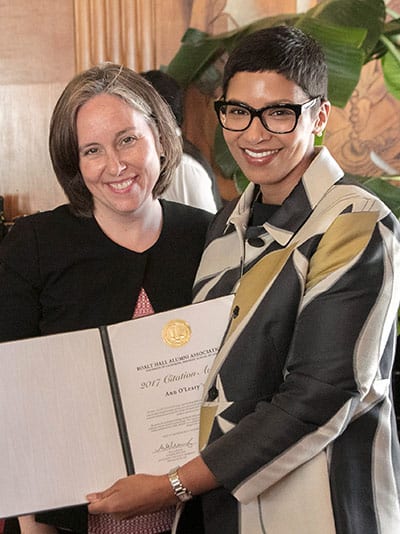
A senior policy advisor to Hillary Clinton’s presidential campaign and co-executive director of the Clinton-Kaine transition team, O’Leary is now a partner at Boies Schiller Flexner in Palo Alto. She described the challenges of moving forward after Clinton’s narrow loss to Donald Trump in November’s election.
“Maya Angelou taught us it may be necessary to encounter the defeats so you know who you are, what you can rise from, and how you can still come out of it,” said O’Leary, who has also served as deputy city attorney for San Francisco and a lecturer at Berkeley Law on health law and social policy. “It took me a while to figure out that to rise, I need to do two things: practice law and practice gratitude.”
She credited her time at EBCLC and the Berkeley Journal of Employment and Labor Law for guiding her career path to “fight for the rights of the disenfranchised, the poor, and workers. I found my people, though they teased me for dressing too Talbot for Berkeley.”
O’Leary thanked two Berkeley Law giants who recently died: Former professor and U.S. Ninth Circuit Court of Appeals Judge John Noonan, who “taught me to see the people behind the cases” during her clerkship with him, and pioneering professor and former dean Herma Hill Kay. “She taught me and hundreds of others the law of sex discrimination and mentored me in writing a law review piece on how family leave laws left out low-wage workers,” O’Leary said. “I wouldn’t be surprised if when we finally do elect a woman president, she’ll be one of the many women inspired by the work of Herma Hill Kay.”
Gratitude for Dean Murray
The luncheon ceremony concluded with BHAA President John Kuo ’88 thanking Murray for her exemplary work as interim dean over the past 15 months.
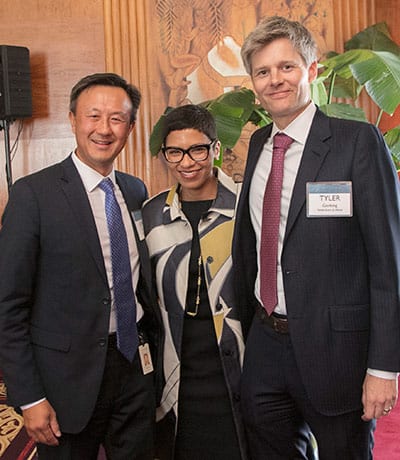
“Melissa, we really owe you a debt of gratitude because you jumped in here … when we needed a very steady hand,” Kuo said. “You jumped in with both feet and have been a fabulous interim dean.”
Kuo and fellow BHAA member Tyler Gerking ’02 presented her with a membership to the famed Metropolitan Museum of Art in New York City, where Murray will be a visiting scholar next school year.
“This has truly been the greatest honor of my professional life, and I’m so excited about what lies ahead for our school,” she said. Touting the impending arrival of Erwin Chemerinsky, who officially becomes Berkeley Law’s new dean on July 1, Murray hailed his “abundant integrity and energy” and a wealth of achievements that prompted National Jurist to call him the nation’s most influential legal scholar.
“He brings a proven record of visionary ideas that advance progress, justice, and diversity,” Murray said. “Erwin is ideally suited to lead our school forward.”